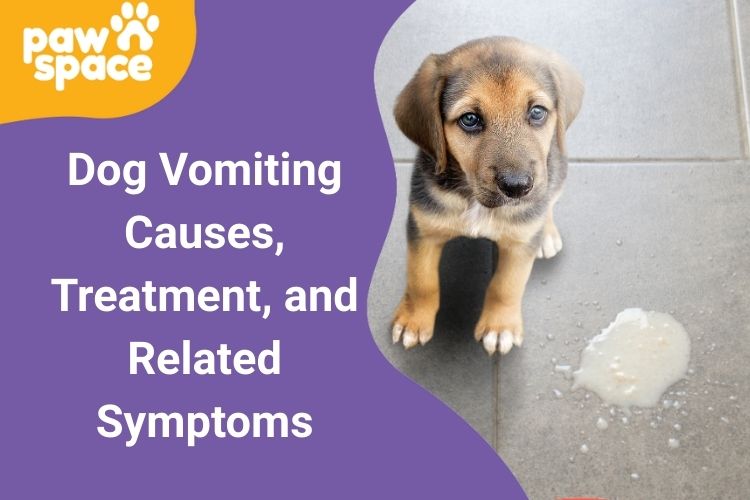Vomiting in canine patients is arguably the most common but worrisome sign owners encounter. It may be as easy as a food indiscretion or as complex as a disease process. Knowing an estimate about this symptom, the moment when veterinary care should be sought, and the appropriate action to take can help significantly in your dog’s cure and well-being. In this blog, we’ll explore the causes of dog vomiting, how to distinguish between mild and serious cases, treatment options, related symptoms to watch for, and why PawSpace is a trusted partner for Fresh Dog Food Bangalore | Healthy & Vet-Approved Mealsa .

Table of Contents
Toggle- Dog Vomiting: Causes, Treatment, and Related Symptoms
- What Causes Vomiting in Dogs?
- Vomiting and Regurgitation: What’s the Difference?
- Associated Symptoms to Monitor
- Acute vs Chronic Vomiting
- Treatment Options for Dog Vomiting
- Conclusion
- FAQs
- 1. Is occasional vomiting healthy for dogs?
- 2. How do I care for my vomiting dog?
- 3. Does stress cause dogs to vomit?
- 4. Is a single vomit in a puppy a cause for concern?
- 5. What about if my dog has been throwing up?
Dog Vomiting: Causes, Treatment, and Related Symptoms
What Causes Vomiting in Dogs?
Vomiting is the body’s natural defense to eliminate toxic or irritating substances from the stomach. In dogs, it can be caused by a myriad of causes ranging from dietary to systemic disease.
Common Causes
- Dietary indiscretion: Eating spoiled food, garbage, or other non-food substances
- Sudden dietary changes: Switching food brands or types too rapidly
- Food intolerance or allergy: Difficulty digesting specific ingredients
- Infections: Bacterial, viral, or parasitic infections
- Toxins: Ingestion of human medications, cleansers, or toxic plants
- Motion sickness: Most common during car trips
- Heatstroke: Overexposure to extreme heat
- Pancreatitis: Pancreatitis inflammation
- Kidney or liver disease: Generally accompanied by other symptoms
- Intestinal obstruction: As a result of swallowed objects, bones, or toys
- Bloat: Twisting of the abdomen in a potentially deadly condition
- Side effects of medications: Some medications trigger vomiting or nausea
Infrequent vomiting can result from innocent causes such as grass ingestion or overeating. Frequent or persistent vomiting should never be ignored.
Vomiting and Regurgitation: What’s the Difference?
- Knowing whether your dog vomits or regurgitates makes the narrowing of the cause better.
- Active vomiting is associated with abdomen contractions. The material brought up is usually partially digested and may contain bile.
- Regurgitation is passive and typically occurs soon after eating. Food is not digested and comes up effortlessly.
- Vomiting is more likely to indicate a serious issue, especially if it’s a recurring and or accompanied by other symptoms.
Associated Symptoms to Monitor
Vomiting is often only a part of a more complex clinical presentation. If your dog shows any of the following signs alongside vomiting, visit a vet immediately:
- Lethargy or weakness
- Abdominal distension or pain
- Vomiting blood or froth
- Diarrhea, especially if bloody
- Fever or dehydration
- Refusal to eat or drink
- Weight loss
- Collapse or seizures
Younger dogs and elderly dogs are at risk and should be checked by a veterinarian even after an episode of vomiting.
Acute vs Chronic Vomiting
Acute Vomiting
It is acute and may be caused by:
- Ingestion of something toxic or irritating
- Heatstroke
- Viral or bacterial infection
- Reaction to medication
- Pancreatitis or bloat
Acute vomiting may be treated with supportive therapy, but if it persists or worsens, a veterinarian has to step in.
Chronic Vomiting
Repeating or ongoing vomiting may indicate:
- Kidney or liver disease
- Cancer
- Inflammation of the intestine
- Parvovirus
- Colitis or constipation
- Systemic illness
Chronic vomiting typically requires diagnostic tests and extended treatment. It must never be ignored.
Treatment Options for Dog Vomiting
Treatment depends on the cause. This is what vets do normally:
Initial Steps
- Fasting: Starving the dog for 12–24 hours to allow the stomach to settle down
- Hydration: Supplying the dog with fresh water
- Dietary change: Switching to bland foods such as boiled chicken and rice temporary
Medical Intervention
- Antiemetics: Medication for controlling vomiting and nausea
- Antibiotics: In case of infection
- Fluid therapy: In dehydration or electrolyte imbalance
- Surgery: In obstruction or bloat
- Diagnostic testing: Blood work, X-rays, ultrasound, or endoscopy to find out the cause
Never give your dog medication yourself. Human drugs are toxic to animals. Always visit a veterinarian first for any medication.

When to See a Vet
You need to see the vet if:
- There is vomiting more than once in 24 hours
- There are other symptoms such as diarrhoea, fever, or lethargy
- Your dog is very young, old, or ill beforehand
- Vomiting continues despite diet changes
- There is blood in vomit or faeces
- Early treatment avoids complications and facilitates a quicker recovery.
Conclusion
Vomiting in dogs may be due to as basic a reason as eating too quickly or as complex a reason as kidney failure. The point is to watch out for the behavior of your dog, keep an eye on associated symptoms, and approach the vet when necessary. With the likes of PawSpace, it is possible now for pet owners in India to access sure, sympathetic care beyond conventional clinics.
Whether your dog needs a recovery plan, a change in diet, or just a safe place to recover, PawSpace is available to you . Because your pet doesn’t just need treatment—but also comfort, compassion, and expert care.
FAQs
1. Is occasional vomiting healthy for dogs?
It is healthy if only occasionally from overeating or because they ate grass, but persistent or extreme vomiting requires veterinary attention.
2. How do I care for my vomiting dog?
Start with simple foods such as boiled rice and chicken. Avoid fatty or spicy foods. Talk to your veterinarian before you modify your dog’s diet in the long term.
3. Does stress cause dogs to vomit?
Yes. It can be due to travel, stress, or change of routine. Behavioural support can help here.
4. Is a single vomit in a puppy a cause for concern?
Yes. Puppies are more vulnerable to parvovirus and other infections. A single incidence must still be taken to the vet.
5. What about if my dog has been throwing up?
PawSpace offers home care, emergency vet access, and recovery care so your dog receives individualised care in a calm environment.
















